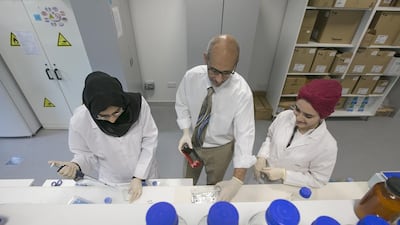UAE University scientists say tests on human cancer cells confirm the region’s most popular spice limits growth of malignant cells, promotes cell death in tumours and reduces inflammation.
AL AIN // Researchers at UAE University have found cancer-fighting properties in one of the region’s most popular spices – saffron.
In 2009 scientists began researching its potential for fighting liver cancer, primarily the most common form, hepatocellular carcinoma. Tests on rats in 2011 yielded positive results but, for the first time, tests on human cancer cells have confirmed the spice's usefulness in treating the deadly disease.
Lead researcher Dr Amr Amin, a biologist, said: “Culinary herbs and spices have been traditionally used not only to improve the flavour of food, but also as folk medicines. Many studies show that saffron has a wide range of medicinal benefits as an antioxidant, memory enhancer, antidepressant, anxiolytic, aphrodisiac, and as a cardioprotective and neuroprotective, which reduces cognitive decline in Alzheimer’s patients.
“First we showed that hibiscus, rosemary and salvia are powerful antioxidants that are excellent for the human liver, then we introduced moringa and ziziphus as natural sources that prevent liver fibrosis. If left untreated, most liver fibrosis normally progress into cirrhosis, which is a common cause of liver cancer.”
Liver cancer is among the deadliest of cancers because it is difficult to diagnose and has limited treatments options, Dr Amin said.
Research shows saffron juice slowed tumour cell division and encouraged cell death in tumours, not only in animals but in human liver cancer cells as well.
The team then tested to see if saffron would be effective against colorectal cancer, another leading cause of cancer-related deaths worldwide, and found the saffron extract promoted cell death among human colorectal cancer cells as well.
Crocin, a compound in saffron, has powerful effects. “Animals administered with crocin before getting cancer showed almost no sign of the disease compared with untreated animals,” Dr Amin said.
“In those protected animals, tumour cells divided less, died more and were associated with less inflammation. All that was very encouraging. However, that was in animals.
“We then looked at the effect of crocin on human liver cancer cells and found very much the same results – cells stop dividing, tend to die more and to have much less inflammation in the presence of crocin.”
Although further clinical trials are needed, Dr Amin said: “For a natural product that is common in our daily meals, adverse effects are not expected to be a problem.”
Wen G Jiang, professor of surgery and tumour biology and dean of international at Cardiff University School of Medicine, said the results were very positive. “It is very pleasing to read the findings from Dr Amin’s study,” he said.
“Over recent years crocin has been found to be able to induce apoptosis of cancer cells, for example, in lung cancer, ovarian cancer, leukaemia cells and certain urological cancer cells. The study by Dr Amin and his colleagues is among the first to use an in vivo tumour model and show a beneficial effect of crocin on liver cancer,” Prof Jiang said.
“The poor diagnosis and limited therapeutic options of liver cancer mandate more concerted efforts to identify and prevent early lesions from progressing to cancer.”
Dr Nagi B Kumar, a professor of oncologic sciences at the University of South Florida, also welcomed the findings. She said: “The results of the study published by Dr Amin and his team adds significantly to the ongoing discovery of such phytochemicals for prevention of early lesions in hepatocellular carcinoma.
“The in vitro and preclinical investigations presented clearly demonstrat the crocin’s anti-inflammatory, pro-apoptotic and anti-proliferative effects against liver cancer. The results of this study are encouraging and offer great promise to the field of cancer chemo prevention.”
mswan@thenational.ae

